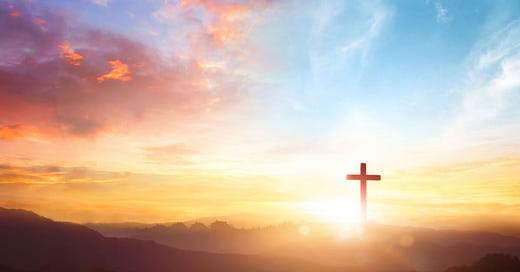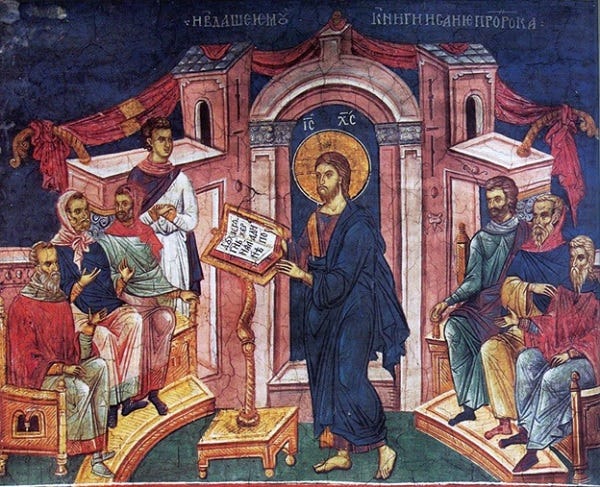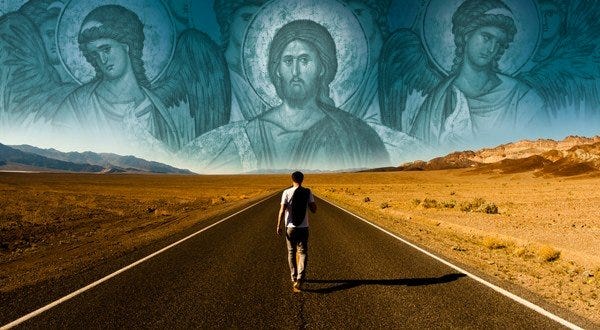To say that God turns away from the sinful is like saying that the sun hides from the blind.”
St. Anthony the Great
Acts 14:6-18
In those days, the apostles fled to Lystra and Derbe, cities of Lycaonia, and to the surrounding country; and there they preached the gospel. Now at Lystra there was a man sitting, who could not use his feet; he was a cripple from birth, who had never walked. He listened to Paul speaking; and Paul, looking intently at him and seeing that he had faith to be made well, said in a loud voice, “Stand upright on your feet.” And he sprang up and walked. And when the crowds saw what Paul had done, they lifted up their voices, saying in Lycaonian, “The gods have come down to us in the likeness of men!” Barnabas they called Zeus, and Paul, because he was the chief speaker, they called Hermes. And the priest of Zeus, whose temple was in front of the city, brought oxen and garlands to the gates and wanted to offer sacrifice with the people. But when the apostles Barnabas and Paul heard of it, they tore their garments and rushed out among the multitude, crying, “Men, why are you doing this? We also are men, of like nature with you, and bring you good news, that you should turn from these vain things to a living God who made the heaven and the earth and the sea and all that is in them. In past generations he allowed all the nations to walk in their own ways; yet he did not leave himself without witness, for he did good and gave you from heaven rains and fruitful seasons, satisfying your hearts with food and gladness.” With these words they scarcely restrained the people from offering sacrifice to them.
John 7:14-30
A bout the middle of the feast Jesus went up into the temple and taught. The Jews marveled at it saying, “How is it that this man has learning, when he has never studied?” So Jesus answered them, “My teaching is not mine, but his who sent me; if any man’s will is to do his will, he shall know whether the teacher is from God or whether I am speaking on my own authority. He who speaks on his own authority seeks his own glory; but he who seeks the glory of him who sent him is true, and in him there is not falsehood. Did not Moses give you the law? Yet none of you keeps the law. Why do you seek to kill me?” The people answered, “You have a demon! Who is seeking to kill you?” Jesus answered them, “I did one deed, and you all marvel at it. Moses gave you circumcision (not that it is from Moses, but from the fathers), and you circumcise a man upon the sabbath. If on the sabbath a man receives circumcision, so that the law of Moses may not be broken, are you angry with me because on the sabbath I made a man’s whole body well? Do not judge by appearances, but judge with right judgment.”
Some of the people of Jerusalem therefore said, “Is not this the man whom they seek to kill? And here he is, speaking openly, and they say nothing to him! Can it be that the authorities really know that this is the Christ? Yet we know where this man comes from; and when the Christ appears, no one will know where he comes from.” So Jesus proclaimed, as he taught in the temple, “You know me, and you know where I come from? But I have not come of my own accord; he who sent me is true, and him you do not know. I know him, for I come from him, and he sent me.” So they sought to arrest him; but no one laid hands on him, because his hour had not yet come.
Midfeast of Pentecost
Today’s celebration is the midpoint of the fifty days between the Feasts of Pascha and Pentecost. Saint John tells us (John 7:14) that “in the midst of the feast Jesus went up into the Temple, and taught.” The Feast in question is the Feast of Tabernacles (celebrated in September), not Pentecost.
The Church has appointed John 7:14-30 to be read for the Midfeast, thereby linking Pascha and Pentecost. In Chapter 8 of Saint John’s Gospel, the Lord came to the Temple again and taught the people who came to Him. After leaving the Temple, he encounters the man born blind. We will hear about him on the Sunday of the Blind Man.
The Troparion of the Midfeast (“In the middle of the Feast, O Savior, fill my thirsting soul with the waters of godliness, as Thou didst cry to all: If anyone thirst, let him come to Me and drink [John 7:37]. O Christ God, Fountain of our life, glory to Thee!”) hints at the encounter of Christ and the Samaritan Woman in just a few days.
Today we perform the Lesser Blessing of Water, and the Blessing of Fields.
Obedience as the Path to Freedom (Part 2)
Archimandrite Georgios Kapsanis, Abbot of the Holy Monastery of Gregoriou †
Now a new generation in born with Jesus Christ as its spiritual founder. The purpose of this generation is to give its freedom to God through obedience, and, moreover, obedience not due to coercion or obligation but to love. ‘Who shall separate us from the love of Christ? Shall trouble or hardship or persecution or famine or nakedness or danger or the sword?’ (Rom. 8, 35). Saint Paul submits to whatever happens, so that he won’t be separated from the love of Christ. This shows that the essence of obedience is love. Within this new, grace-filled state, the children of obedience and love attain the boundaries of true freedom. Freedom from egotism, from the passions, from fear, from the devil, from death. After Saint Anthony had practiced obedience over many years, he attained the state of perfect freedom, love and liberation from the passions: ‘I no longer fear God; I love Him. For love casts out fear’. Love is also the essence of true freedom.
Christians reach this blessed state after great violence which they inflict voluntarily on their egotistical will, in order to submit voluntarily to the holy will of God. As the Lord says in the Holy Gospel: ‘the kingdom of heaven has suffered violence and the violent take it by force’ (Matth. 11, 12). The experience of the saints can be summed up as: ‘Give blood, receive spirit’. With the blood of your heart which you shed, you’re purified of the passions. Then you’re able to receive the grace of the Holy Spirit. ‘For where the Spirit of the Lord is, there is freedom’ (2 Cor. 3, 17).
Christians who are striving realize that freedom is them living in God and God living in them. For unbelievers, freedom resides in egotism: ‘I’m free when I’m doing what I want’. For Christians freedom resides in love and in God: ‘I’m free when I’m doing what God wants. As Saint Symeon of Thessaloniki says: ‘And then people’s will and independence will come into play, when they willingly want the will of the Creator’ (Epistle to the Lavriotes). Freedom is grace, a gift. The struggle of the faithful is to contribute and cooperate, to accept and not react against divine Grace.
Freedom through obedience. This seems paradoxical and contradictory. So does the mystery of the Holy Trinity. But in both instances, they’re true precisely because they’re contradictory. They take us to another condition of being, that of the future age. If they weren’t contradictory, they’d leave us in the same situation in which we find ourselves now, in the present age. ‘If the nous is free of all its enemies and keeps the sabbath [i.e. refrains from working], it is in another, new age where it reflects on new and imperishable things’ (Saint Isaiah the Anchorite).
Christ’s slaves become emancipated. Christ liberates all those who become His slaves. When people want to become slaves of Christ, obedient to Him, He makes them His friends. He brings them into His kingdom. ‘You are my friends. I no longer call you servants (Jn. 15, 14). In the Church, people serve and obey Christ and so they become free. ‘The servant of God is baptized in the name of the Father, the Son and the Holy Spirit . ‘The servant of God is given communion’. Through this servitude, Christians become the children of the ‘blessed Kingdom of the Father and of the Son and of the Holy Spirit’. This is the Kingdom which has freedom and love at its core.
Christians enjoy this freedom particularly at Holy Communion and in worship. The most venerable Elder Afxentios, a monk of our monastery who fell asleep in the Lord last March, entreated us not to hinder him from taking part in the services, even though he was exhausted with age and was blind, to boot. He used to say: ‘I sense freedom in church’. At the Divine Liturgy and the other services, we’re liberated from corruption, death and the devil; we’re transformed and made imperishable. ‘Now’ becomes ‘ever’, because we’re partaking in the Kingdom of God. This is real freedom.
With all its institutions, the Church helps its children on the upward path towards freedom in Christ.
This week’s calendar reminders:
Monday 5/12: Matins 8:30 a.m.; Stewards’ Meeting 6:30 p.m.
Tuesday 5/13: no services or events
Wednesday 5/14: no services or events
Thursday 5/15: Matins 8:30 a.m.
Friday 5/16: Matins 8:30 a.m.
Saturday 5/17: Catechumen Class 4:30 p.m.; Great Vespers 6 p.m.
Sunday 5/18: Divine Liturgy 9:15 a.m.
CLICK BELOW to donate online:
Christ the Savior Orthodox Church is located in Southbury, Connecticut, and is part of the New England Diocese of the Orthodox Church of America.
Mailing address: Christ the Savior Church, 1070 Roxbury Road, Southbury, CT 06488
PLEASE DONATE to help our parish do the work of the Lord, thrive and grow, and extend the Kingdom of God. May the Lord bless your generosity!
Fr. Moses Locke can be reached at frmoseslocke@gmail.com











